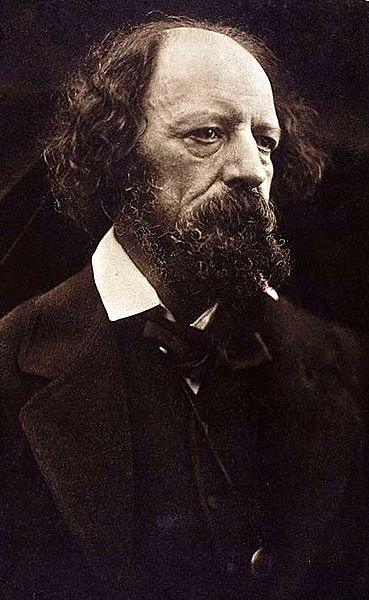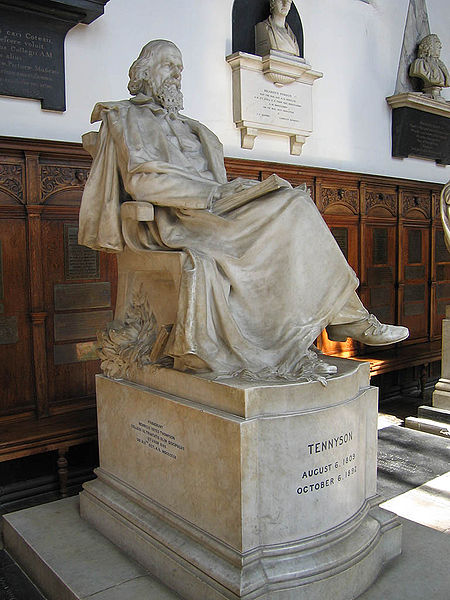<Back to Index>
- Biologist Sir Alexander Fleming, 1881
- Poet Alfred Tennyson, 1809
- Prime Minister of Malta Dominic Mintoff, 1916


Alfred Tennyson, 1st Baron Tennyson, FRS (6 August 1809 – 6 October 1892), much better known as "Alfred, Lord Tennyson," was Poet Laureate of the United Kingdom during much of Queen Victoria's reign and remains one of the most popular poets in the English language.
Tennyson excelled at penning short lyrics, "In the valley of Cauteretz", "Break, Break, Break", "The Charge of the Light Brigade", "Tears, Idle Tears" and "Crossing the Bar". Much of his verse was based on classical mythological themes, such as Ulysses, although In Memoriam A.H.H. was written to commemorate his best friend Arthur Hallam, a fellow poet and fellow student at Trinity College, Cambridge, who was engaged to Tennyson's sister, but died from a cerebral hemorrhage before they were married. Tennyson also wrote some notable blank verse including Idylls of the King, Ulysses, and Tithonus. His use of blank verse, rare in his day, may be related to his complete tone deafness which made it hard for him to follow the conventional rhythms of the poetry of his day. During his career, Tennyson attempted drama, but his plays enjoyed little success. Tennyson
wrote a number of phrases that have become commonplaces of the English
language, including: "Nature, red in tooth and claw", "'Tis better to
have loved and lost / Than never to have loved at all", "Theirs not to
reason why, / Theirs but to do and die", "My strength is as the
strength of ten, / Because my heart is pure", "Knowledge comes, but
Wisdom lingers", and "The old order changeth, yielding place to new".
He is the second most frequently quoted writer in The Oxford Dictionary of Quotations after Shakespeare. Tennyson was born in Somersby, Lincolnshire, a rector's son and fourth of 12 children. He was a descendant of King Edward III of England. Reportedly,
"the pedigree of his grandfather, George Tennyson, is traced back to
the middle-class line of the Tennysons, and through Elizabeth Clayton
ten generations back to Edmund, Duke of Somerset, and farther back to Edward III." His father, George Clayton Tennyson (1778–1831), was a rector for Somersby (1807–1831), also rector of Benniworth and Bag Enderby, and vicar of Grimsby (1815).
The reverend was the elder of two sons, but was disinherited at an
early age by his own father, the landowner George Tennyson (1750–1835)
(who belonged to the Lincolnshire gentry as the owner of Bayons Manor and Usselby Hall), in favour of his younger brother Charles, who later took the name Charles Tennyson d' Eyncourt.
Rev. George Clayton Tennyson raised a large family and "was a man of
superior abilities and varied attainments, who tried his hand with fair
success in architecture, painting, music, and poetry." Rev.
Tennyson was "comfortably well off for a country clergyman and his
shrewd money management enabled the family to spend summers at Mablethorpe and Skegness, on the eastern coast of England." His mother, Elizabeth Fytche (1781–1865) was the daughter of Stephen Fytche (1734–1799), vicar of St. James Church, Louth (1764) and rector of Withcall (1780), a small village between Horncastle and Louth. Tennyson's father "carefully attended to the education and training of his children." Tennyson
and two of his elder brothers were writing poetry in their teens, and a
collection of poems by all three was published locally when Alfred was
only 17. One of those brothers, Charles Tennyson Turner later married Louisa Sellwood, the younger sister of Alfred's future wife; the other poet brother was Frederick Tennyson.
One of Tennyson's other brothers, Edward Tennyson, was
institutionalised at a private mental asylum, where he died. Tennyson
was first a student of Louth Grammar School for four years (1816–1820) and then attended Scaitcliffe School, Englefield Green and King Edward VI Grammar School, Louth. He entered Trinity College, Cambridge in 1827, where he joined a secret society called the Cambridge Apostles. At Cambridge Tennyson met Arthur Henry Hallam, who became his best friend. His first publication was a collection of
"his boyish rhymes and those of his elder brother Charles" entitled Poems by Two Brothers published in 1827. In 1829 he was awarded the Chancellor's Gold Medal at Cambridge for one of his first pieces, "Timbuctoo". Reportedly, "it was thought to be no slight honour for a young man of twenty to win the chancellor's gold medal." He published his first solo collection of poems, Poems Chiefly Lyrical in 1830. "Claribel" and "Mariana",
which later took their place among Tennyson's most celebrated poems,
were included in this volume. Although decried by some critics as
overly sentimental, his verse soon proved popular and brought Tennyson
to the attention of well-known writers of the day, including Samuel Taylor Coleridge. In the spring of 1831, Tennyson's father died, requiring him to leave Cambridge before
taking his degree. He returned to the rectory, where he was permitted
to live for another six years, and shared responsibility for his
widowed mother and the family. Arthur Hallam came to stay with his family during the summer and became engaged to Tennyson's sister, Emilia Tennyson. In 1833, Tennyson published his second book of poetry, which included his well-known poem, The Lady of Shalott. The
volume met heavy criticism, which so discouraged Tennyson that he did
not publish again for 10 more years, although he continued to write.
That same year, Hallam died suddenly and unexpectedly after suffering a cerebral haemorrhage while on vacation in Vienna. Hallam's
sudden and unexpected death in 1833 had a profound impact on Tennyson,
and inspired several masterpieces, including "In the Valley of
Cauteretz" and In Memoriam A.H.H., a long poem detailing the 'Way of the Soul'. Tennyson and his family were allowed to stay in the rectory for some time, but later moved to Essex.
An unwise investment in an ecclesiastical wood-carving enterprise soon
led to the loss of much of the family fortune. He then moved to London. In 1842, while living modestly in London, Tennyson published two volumes of Poems,
the first of which included works already published and the second of
which was made up almost entirely of new poems. They met with immediate
success. Poems from this collection, such as Locksley Hall, "Tithonus", and "Ulysses" have met enduring fame. The Princess: A Medley, a satire of women's education, which came out in 1847, was also popular for its lyrics. W.S. Gilbert later adapted and parodied the piece twice: in The Princess (1870) and in Princess Ida (1884). It was in 1850 that Tennyson reached the pinnacle of his career, finally publishing his masterpiece, In Memoriam A.H.H., dedicated to Hallam. Later the same year he was appointed Poet Laureate in succession to William Wordsworth. In the same year (13 June), Tennyson married Emily Sellwood, whom he had known since childhood, in the village of Shiplake. They had two sons, Hallam Tennyson (b. 11 August 1852) — named after his friend — and Lionel (b. 16 March 1854). After William Wordsworth's death in 1850, Tennyson succeeded to the position of Poet Laureate,
which he held until his own death in 1892, by far the longest tenure of
any laureate before or since. He fulfilled the requirements of this
position by turning out appropriate but often uninspired verse, such as
a poem of greeting to Alexandra of Denmark when she arrived in Britain to marry the future King Edward VII. In 1855, Tennyson produced one of his best known works, "The Charge of the Light Brigade", a dramatic tribute to the British cavalrymen involved in an ill-advised charge on 25 October 1854, during the Crimean War. Other esteemed works written in the post of Poet Laureate include Ode on the Death of the Duke of Wellington and Ode Sung at the Opening of the International Exhibition. Queen Victoria was an ardent admirer of Tennyson's work, and in 1884 created him Baron Tennyson, of Aldworth in the County of Sussex and of Freshwater in the Isle of Wight. Tennyson initially declined a baronetcy in 1865 and 1868 (when tendered by Disraeli), finally accepting a peerage in 1883 at Gladstone's earnest solicitation. He took his seat in the House of Lords on 11 March 1884. Tennyson
also wrote a substantial quantity of non-official political verse, from
the bellicose "Form, Riflemen, Form", of the French crisis of 1852, to
"Steersman, be not precipitate in thine act/of steering", deploring
Gladstone's Home Rule Bill. Virginia Woolf wrote a play Freshwater, showing Tennyson as host to his friends Julia Margaret Cameron and G.F.Watts; Tennyson was the first to be raised to a British Peerage for
his writing. A passionate man with some peculiarities of nature, he was
never particularly comfortable as a peer, and it is widely held that he
took the peerage in order to secure a future for his son Hallam. Thomas Edison made sound recordings of Tennyson reading his own poetry, late in his life. They include recordings of The Charge of the Light Brigade, and excerpts from "The splendour falls" (from The Princess), "Come into the garden" (from Maud),
"Ask me no more", "Ode on the death of the Duke of Wellington", "Charge
of the Heavy Brigade", and "Lancelot and Elaine"; the sound quality is
as bad as wax cylinder recordings usually are. Tennyson continued writing into his eighties, and died on 6 October 1892, aged 83. He was buried at Westminster Abbey. A memorial was erected in All Saints' Church, Freshwater. His last words were; "Oh that press will have me now!". He was succeeded as 2nd Baron Tennyson by his son, Hallam, who produced an authorised biography of his father in 1897, and was later the second Governor-General of Australia.